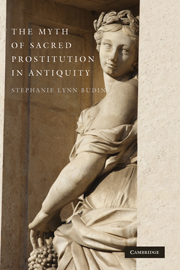Book contents
- Frontmatter
- Contents
- Acknowledgments
- Abbreviations
- THE MYTH OF SACRED PROSTITUTION IN ANTIQUITY
- 1 Introduction
- 2 The Ancient Near Eastern Data
- 3 The So-Called “Evidence”
- 4 Herodotos
- 5 In the Footsteps of Herodotos: Lucian and “Jeremiah”
- 6 Pindar Fragment 122
- 7 Strabo, Confused and Misunderstood
- 8 Klearkhos, Justinus, and Valerius Maximus
- 9 Archaeological “Evidence” from Italy
- 10 The Early Christian Rhetoric
- 11 Last Myths
- Bibliography
- Index
- Index Locorum
3 - The So-Called “Evidence”
Published online by Cambridge University Press: 18 August 2009
- Frontmatter
- Contents
- Acknowledgments
- Abbreviations
- THE MYTH OF SACRED PROSTITUTION IN ANTIQUITY
- 1 Introduction
- 2 The Ancient Near Eastern Data
- 3 The So-Called “Evidence”
- 4 Herodotos
- 5 In the Footsteps of Herodotos: Lucian and “Jeremiah”
- 6 Pindar Fragment 122
- 7 Strabo, Confused and Misunderstood
- 8 Klearkhos, Justinus, and Valerius Maximus
- 9 Archaeological “Evidence” from Italy
- 10 The Early Christian Rhetoric
- 11 Last Myths
- Bibliography
- Index
- Index Locorum
Summary
There is no evidence for sacred prostitution in the ancient Near East, and thus it is not possible to argue that the supposed practice came from there. Nevertheless, there are numerous texts in the Classical corpus, including Greek, Roman, and early Christian, that have been taken as evidence for the existence of sacred prostitution in antiquity, including its origin in the Near East. What follows is a gathering of the most important of these texts. A number of points must be kept in mind when considering what follows.
It is nearly impossible to pull together a complete list of texts pertaining to sacred prostitution, as every scholar dealing with the issue will have a different sense of what texts actually discuss or allude to the phenomenon. In some cases, as with Herodotos 1.199 (Chapter Four), the reference seems quite overt. In other instances, as with the Simonides epigram (Chapter Six), the reference is more implied than direct. And with others, such as the Tralles inscriptions (Chapter Seven), the reference is entirely inferred. What I have chosen to include here is the more blatant examples, where there is at least a word or description that might summon images of sacred prostitution. The more inferred examples (and, as I shall show throughout this work, even the majority of the supposed references to sacred prostitution here are actually inferred) appear throughout the book in their appropriate chapters.
- Type
- Chapter
- Information
- The Myth of Sacred Prostitution in Antiquity , pp. 48 - 57Publisher: Cambridge University PressPrint publication year: 2008



